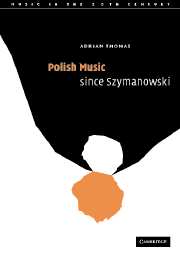Book contents
- Frontmatter
- Contents
- List of musical examples
- Preface
- Acknowledgements
- List of abbreviations
- Part I The captive muse
- Part II Facing west
- 6 The ‘Warsaw Autumn’
- 7 Engaging with the avant-garde
- Part III The search for individual identity
- Part IV Modernisms and national iconographies
- Part V Postscript
- Appendix 1 Cultural events in Poland, 1953–6
- Appendix 2 ‘Warsaw Autumn’ repertoire, 10–21 October 1956
- Appendix 3 ‘Warsaw Autumn’ repertoire, 1958–61
- Appendix 4 Selected Polish chronology (1966–90)
- Notes
- Select bibliography
- Index
7 - Engaging with the avant-garde
Published online by Cambridge University Press: 22 September 2009
- Frontmatter
- Contents
- List of musical examples
- Preface
- Acknowledgements
- List of abbreviations
- Part I The captive muse
- Part II Facing west
- 6 The ‘Warsaw Autumn’
- 7 Engaging with the avant-garde
- Part III The search for individual identity
- Part IV Modernisms and national iconographies
- Part V Postscript
- Appendix 1 Cultural events in Poland, 1953–6
- Appendix 2 ‘Warsaw Autumn’ repertoire, 10–21 October 1956
- Appendix 3 ‘Warsaw Autumn’ repertoire, 1958–61
- Appendix 4 Selected Polish chronology (1966–90)
- Notes
- Select bibliography
- Index
Summary
Inevitably, this upsurge in activity and creative enthusiasm, even if it was to a large extent concentrated on ten days each year in Warsaw, filtered right through Polish musical life, to composers, performers and those involved in higher education; there was a strong feeling of liberation and anticipation. When the ZKP held its ninth General Assembly six months after the first ‘Warsaw Autumn’, in March 1957 (it had been two years since the previous meeting), Lutosławski spoke for most of its membership when he said:
So our assembly, for the first time in a very long while, is taking place in an atmosphere of true creative freedom. No one here will persecute anyone for so-called formalism, no one will prevent anyone from expressing his aesthetic opinions, regardless of what individual composers represent.
When today, from the perspective of eight and a half years, I look back on the notorious conference in Łagów in 1949, when the frontal attack on Polish musical creativity began, I go cold just remembering that dreadful experience … We all know that it was the work of people to whom the very idea of beauty is totally foreign, people for whom music is of no interest unless there is some tale or legend attached.
The period of which I speak may not have lasted long, because it actually passed a couple of years ago, but it was nevertheless long enough to have visited tremendous damage on our music. The psyche of a creative artist is an extremely delicate and precise instrument. So the attack on that instrument and the attempt to subdue it caused not a few of us moments of severe depression. Being completely cut off from what was happening in the arts in the West likewise played no small role in that dismal experiment to which we were subjected.
Have we shaken ourselves free of this state of dejection? Do we have enough enthusiasm for new creative explorations? Certainly, yes. But even so our situation is far from easy. Before each of us stands the problem of finding our place in the tumult represented by the arts of our time … Not all of us have a clear view on what is happening in this music, where it is going. I believe, however, that it is only a question of time, that not only will we reach a clear view on the situation but also that we will play a positive and not insignificant role in it.
- Type
- Chapter
- Information
- Polish Music since Szymanowski , pp. 92 - 110Publisher: Cambridge University PressPrint publication year: 2005



